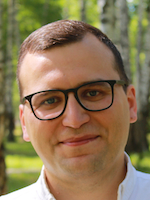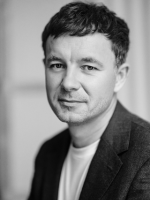 | Liliya Khasanova is a post-doctoral fellow, researcher, negotiator, and peacemaker. Liliya specializes in international public law and governance, with a particular focus on international law of cyberspace, international trade law, dispute settlement, and international negotiations. She completed her Ph.D. dissertation on "Mutually Agreed Solutions in the WTO: Theory and Practice" in 2019, providing an interdisciplinary analysis of non-binding bilateral agreements and their role in the WTO legal system. Her current research interests include national and cultural perspectives on international law of cyberspace, global data governance, and the impact of information and communication technologies (ICTs) on the international legal order. Before joining the Russia and Eurasia Program at the Fletcher School, Liliya was a post-doctoral fellow at the Berlin Potsdam Research Group ‘International Rule of Law – Rise or Decline?’ and at the Nanterre Center for International Law (CEDIN). She also served as a graduate research fellow at the Program on Negotiation at Harvard Law School and was a visiting fellow at the University of Fribourg (Switzerland) and the Stockholm Center for International Law and Justice. In 2021, she was selected as a Women, Peace, and Security (WIIS) Next Generation Fellow. |
 | Pavel Luzin, Ph.D. in international relations (IMEMO, 2012), is a researcher of Russia’s foreign policy and defense, space policy, and global security issues. Luzin is a visiting scholar at The Fletcher School (USA) and a contributor to the Foreign Policy Research Institute (USA), the Jamestown Foundation (USA), and Riddle (Intersection Foundation, Lithuania). In 2017–2018, he was a consultant on armed forces, law enforcement agencies, and defense industry issues for Alexei Navalny’s presidential campaign. In 2016–2018, he was a consultant on Russia’s domestic politics for the “Nations in Transit” project at Freedom House (USA). In 2013–2014, Luzin was a research fellow at IMEMO (Russia). In 2013, he was an assistant to the editor-in-chief of the Security Index journal at PIR Center (Russia). Luzin was also a lecturer and senior lecturer at Perm State University (Russia) in 2010–2017, a senior lecturer at HSE (Perm campus, Russia) in 2011–2013, and a visiting assistant professor at HSE (Perm campus, Russia) in 2018–2019. |
 | Vitali Shkliarov is a visiting scholar with the Russia and Eurasia Program at The Fletcher School. He is a Belarusian-American award-winning political strategist, columnist, expert on U.S.-Russia relations, and activist with extensive experience in international and American political campaigns and civic movements. Born in Belarus and educated in the United States and Europe, Shkliarov has built a diverse career spanning multiple continents, becoming a key figure in political consulting and grassroots activism. He has orchestrated political races in the United States, Europe, Germany, Belarus, Ukraine, Georgia, and Russia, advising prominent opposition figures and promoting democratic values in authoritarian regimes. As a political strategist and activist, he has shaped global political conversations and emerged as a leading figure in the fight for democratic governance and human rights in Eastern Europe. In 2020, Shkliarov’s life took a dramatic turn when he was arrested in Belarus during a government crackdown on dissent. Detained in harsh conditions in a maximum-security facility for nearly four months, his situation became the focus of international attention. His ordeal raised the attention of human rights groups, journalists, and diplomatic organizations, leading to widespread calls for his release. |
 | Mikhail Troitskiy is a visiting professor at the Fletcher School of Law and Diplomacy and a visiting fellow at the Davis Center for Russian and Eurasian Studies, Harvard University. In 2023-24 he was Professor of Practice in Russian Studies at the University of Wisconsin-Madison. His research on conflicts, security, and international negotiation has been published with WIREs Climate Change, Problems of Postcommunism, Survival, Global Policy, The Bulletin of the Atomic Scientists, and other journals. In 2009-15, Troitskiy was Deputy Director and Program Officer at the Moscow office of the MacArthur Foundation. He taught at the European University at St. Petersburg in 2014-22, and at MGIMO University in Moscow in 2003-22. Troitskiy is a member of PONARS Eurasia and Processes of International Negotiation networks of scholars. His personal research website is at http://mikhailtroitskiy.com |